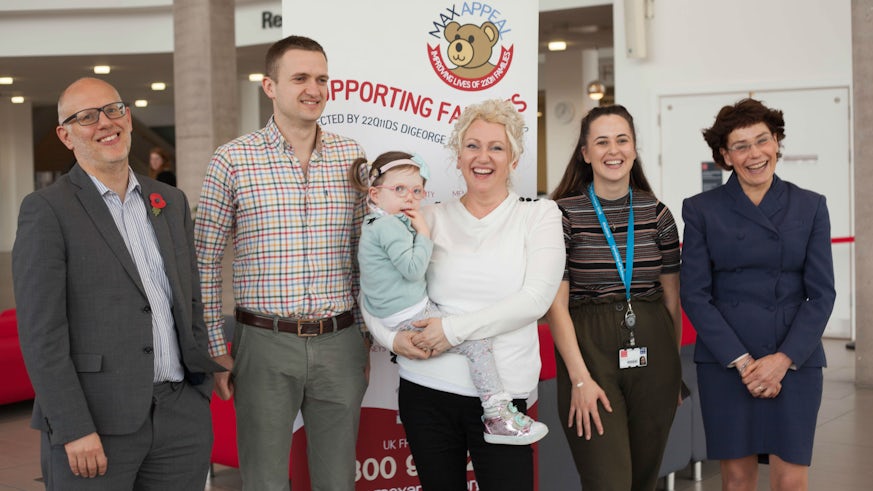Awareness of 22q
22 November 2018

Researchers at Cardiff University are working to understand a relatively common genetic condition that most people haven’t heard of.
The ECHO study, based at the Division of Psychological Medicine and Clinical Neurosciences, aims to identify the challenges faced by people with 22q11.2 Deletion Syndrome (22q11.2DS), which is thought to be the second most common genetic condition behind Down’s Syndrome.
Estimates for how many people are affected by the condition have ranged between one in 4,000 and one in 2,000 live births but the actual figure of the number of people affected is expected to be higher than current estimations as not all individuals may be diagnosed.
There are a wide range of health issues associated with the syndrome, such as heart conditions and immune problems, palatal defects and speech delays. It can also cause developmental problems and learning disabilities. Children with 22q11.2DS may have a higher chance of experiencing mental health problems such as autism, ADHD and anxiety disorder. Adults with 22q11.2DS are at increased risk of depression and schizophrenia.
The health issues faced by individuals with 22q11.2DS can vary greatly from one person to the next; some people are only mildly affected and may not even realise they have it, while others need support throughout their lives.

Led by Professor Marianne van den Bree, the team are studying individuals around the UK who have the condition, which is also known as Velo Cardio Facial or Di George Syndrome. Their research examines development at all stages, including preschool years, childhood, adolescence and adulthood.
Based in the University’s Haydn Ellis Building, the team is one of the lead sites of the 22 research groups of the 22q11.2DS International Brain and Behavior Consortium working together to better understand the symptoms of the condition, so that the appropriate diagnosis and support can be offered to affected families.
Studies by the ECHO team of children with the deletion have shown 55% of children with 22q11.2DS met criteria for a mental health condition, compared to 11% of siblings without the deletion. They also showed children with the deletion were more likely to perform worse on tests of attention, planning and reaction time. Furthermore, by following children into the teenage years they found that these issues persist through development.
Recently, the team found that 81% of children with the deletion have movement and coordination difficulties, compared to 6% of their siblings. Children with these difficulties were found to be more likely to have mental health problems and more difficulties with attention.
A separate study of parents of children with the condition found that 42% first learned about the risk of mental health problems associated with the syndrome from the internet with fewer (27%) learning this information from a clinician.
Professor Marianne van den Bree said: “Despite 22q now being considered as one of the most common genetic conditions, there is still much to be learnt about what this means for those affected.

Our research is expanding knowledge on the mental health aspects associated with the syndrome, to help identify how children and adults can be best supported during their lives. It is clear from our research so far that there is still a lack of awareness – among the medical community as well as the public. Our work is part of a drive to change that.
Three-year-old Eloise Lee, from Leeds, has taken part in the ECHO study. 22q 11 Deletion Syndrome has affected Eloise in various ways including a cleft palate, a congenital heart defect, hearing impairment, ligaments laxity and problems with speech and communication.
Her mum Dawn said: “We will need to wait and see how the condition develops as she grows up. With the support of her many specialists, we hope to receive interventions to support her throughout her life.”
The Echo Study is supported by Max Appeal, a charity that supports families affected by 22q. November is 22q Awareness Month and they are encouraging families to consider taking part in the research.
Julie Wootton, founder of Max Appeal said: “Good quality research, such as that undertaken by Cardiff University, is vital to increase knowledge of 22q11DS. Better understanding should then lead to increased awareness among health professionals and improved treatments for people with 22q11DS.”
To find out more about the ECHO Study contact: echo@cardiff.ac.uk or +44 (0)29 2068 8354
The ECHO study would like to thank all the children and families who have taken part and shared their experiences of 22q. This work is supported by NHS Medical Genetic clinics, Maxappeal, Unique and 22Crew. The project is funded by the Wellcome Trust, Medical Research Council, the Waterloo Foundation, the Baily Thomas Charitable Fund, the National Institute of Mental Health and 22Crew.



